Coin Values Moving with Precious Metals: Up-Dated 2/2/2026: Gold $4456 | Silver $72.85
1911 Penny Value
How to identify 1911 penny value. Complete judgement to worth considers: Date | Mintmark | Condition
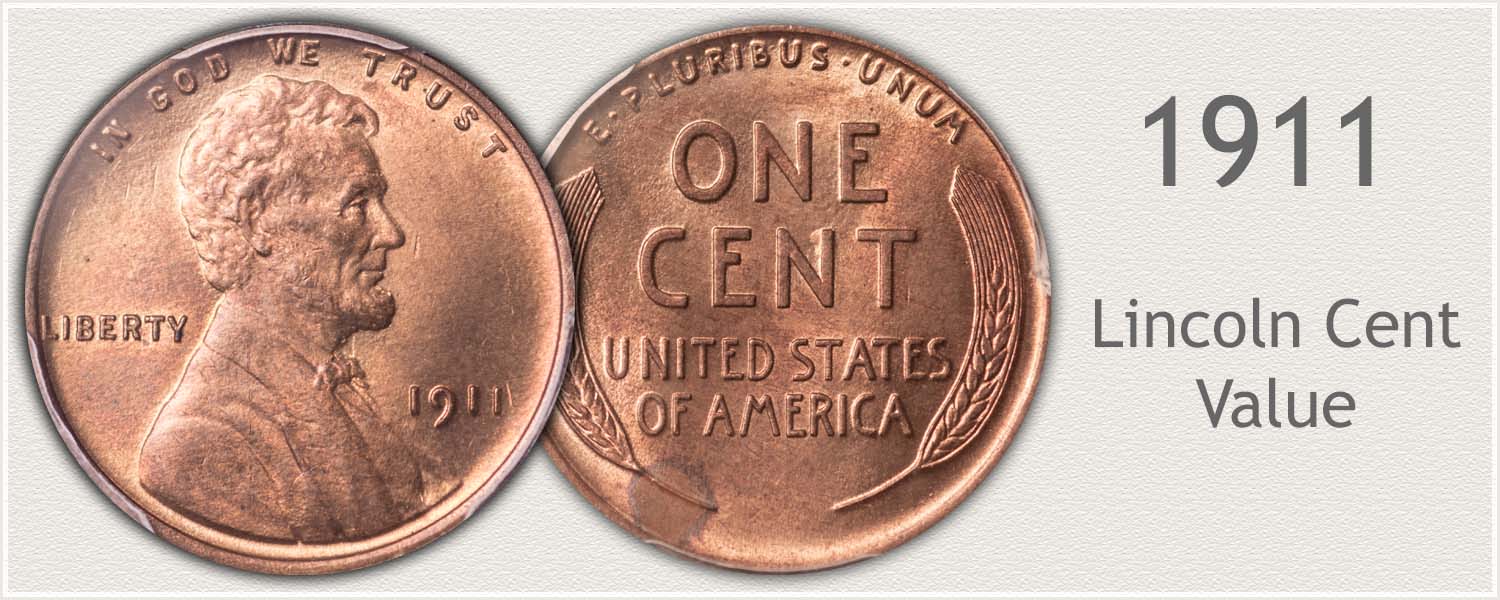
Steps Leading to Value:
- Step 1: Date and Mintmark Variety – Identify each date and its mintmark variety. Three distinct wheat pennies were minted in 1911.
- Step 2: Grading Condition – Judge condition to determine grade.
- Step 3: Special Qualities – Certain elements either enhance or detract from value.
| 1911 Lincoln Penny Value | ||||
|---|---|---|---|---|
| Condition of Coin | ||||
| Date | Good | Fine | Extremely Fine | Uncirculated |
| 1911 Lincoln Penny Value Up-Dated | 2026 | |||
| 1911 | $0.53 | $1.41 | $5.89 | $13 |
| 1911 D | $3.17 | $8.88 | $46 | $74 |
| 1911 S | $16 | $33 | $60 | $133 |
Using a step by step process determines if the important "S" mintmark is present. Next a judgement of condition narrows the value range on the chart.
Firstly: Three distinct wheat pennies were minted in 1911, each valued separately. Philadelphia mint, Denver and San Francisco mints all produced pennies. Mintmarks are used to identify the different coins. Both the 1911-D and 1911-S wheat cents are semi-key dates to the series. Both of these early era coins are sought by collectors in grades from "good" and above.
Important mintmarks are imaged and the grading section describes points to consider when judging condition. Visualize condition by comparing to images in the grading section.
Step 1: | Date and Mintmark Combination
The "S" Mintmark Stands Out in Value
1911 saw the entry of the Denver mint striking cents for the first time, creating a desirable issue. A few important points are covered in the Date | Mint Mark varieties of 1911.
Any San Francisco cent from these early years continues to require proper attention. Additionally, grading is one of the key factors in determining value of these early cents. Close inspection often separates large value differences within subtle details.
1911 Lincoln Penny
No Mintmark Under Date: Philadelphia Mint Struck the Coin
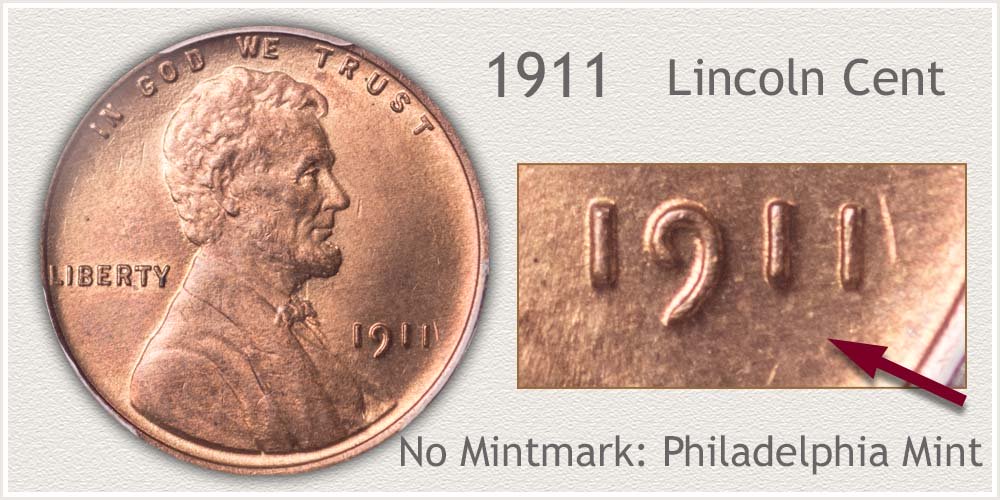
Somewhat abundant in numbers, 1911 cents do enjoy popularity if not heavily worn. A quick rise in value, if just lightly worn, indicates a degree of difficulty in finding a nice example. Notice the value in the Extremely Fine grade.
Looking closely at your coin, Lincoln's bust, when first minted, showed a detailed bowtie. A desirable, higher value coin shows a separation of the bowtie from the shirt. This is a quick evaluation, more detail to grading is described below.
1911-D Lincoln Penny
"D" Mintmark Under Date: Denver Mint Struck the Coin
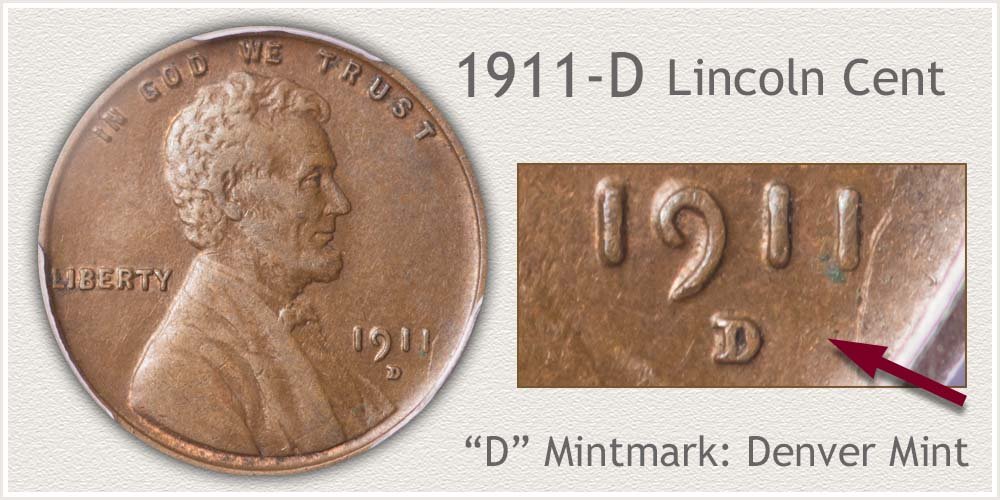
The 1911-D is a challenge to find in nice eye appealing grade. It enjoys a strong beginning value in heavily worn condition. Grading condition is very important as seen on the chart, notice value in Extremely Fine grade.
Denver mint struck cents for the first time in 1911 making this variety a "first year" type. An extra feature, assuring popularity and demand from collectors assembling sets of the early wheat cents. Mintage numbers 1911-D: 12,672,000 pieces.
Alert: Altered Dates: A 1941-D with part of the "4" removed attempts to portray a scarce 1911 Denver penny. A true 1911-D has even spacing among all digits of the date.
1911-S Lincoln Penny
"S" Mintmark Under Date: San Francisco Mint Struck the Coin
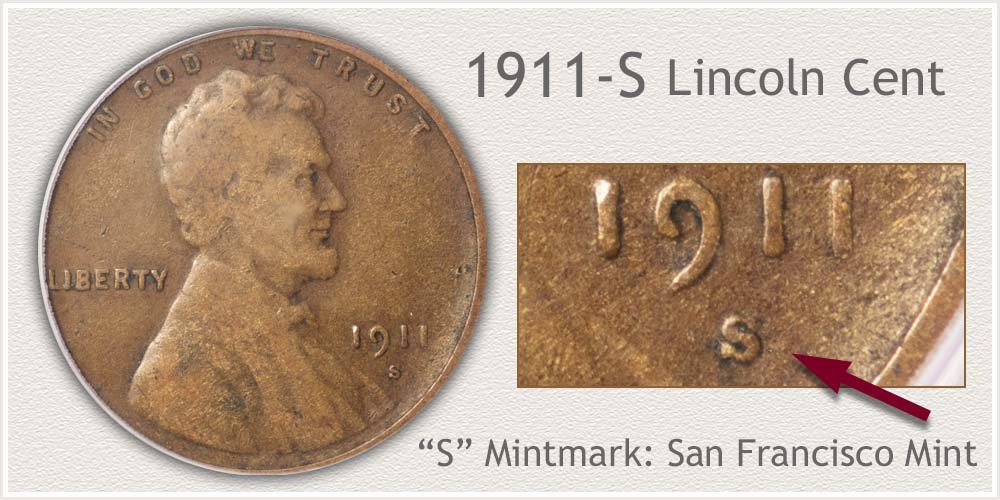
Rarity: Semi-Key 1911-S wheat pennies are the 6th lowest mintage of the wheat series. 4,026,000 cents were struck at the San Francisco. A scarce and desirable penny in all grades. Finding a standout example is one with crisp details to the design. Well defined lettering and sharp striking of the date would set the coin apart.
Alert: Altered Dates: Removing part of the "4" from a 1944-S attempts to mimic a rare 1911-S. Spacing of the date is even on authentic pieces.
Step 2: | Judge Condition to Identify Grade
1911 Lincoln Penny Value is Conditional
Grade is a definition used by collectors when describing the condition of a coin. Grades listed on the chart range from Good (heavily worn penny) to Uncirculated (no wear). Specific areas are inspected to judge condition.
Handel your coins by the edges avoiding touching the surface. Copper picks up and reacts to most substances. From this point on preservation maintains value.
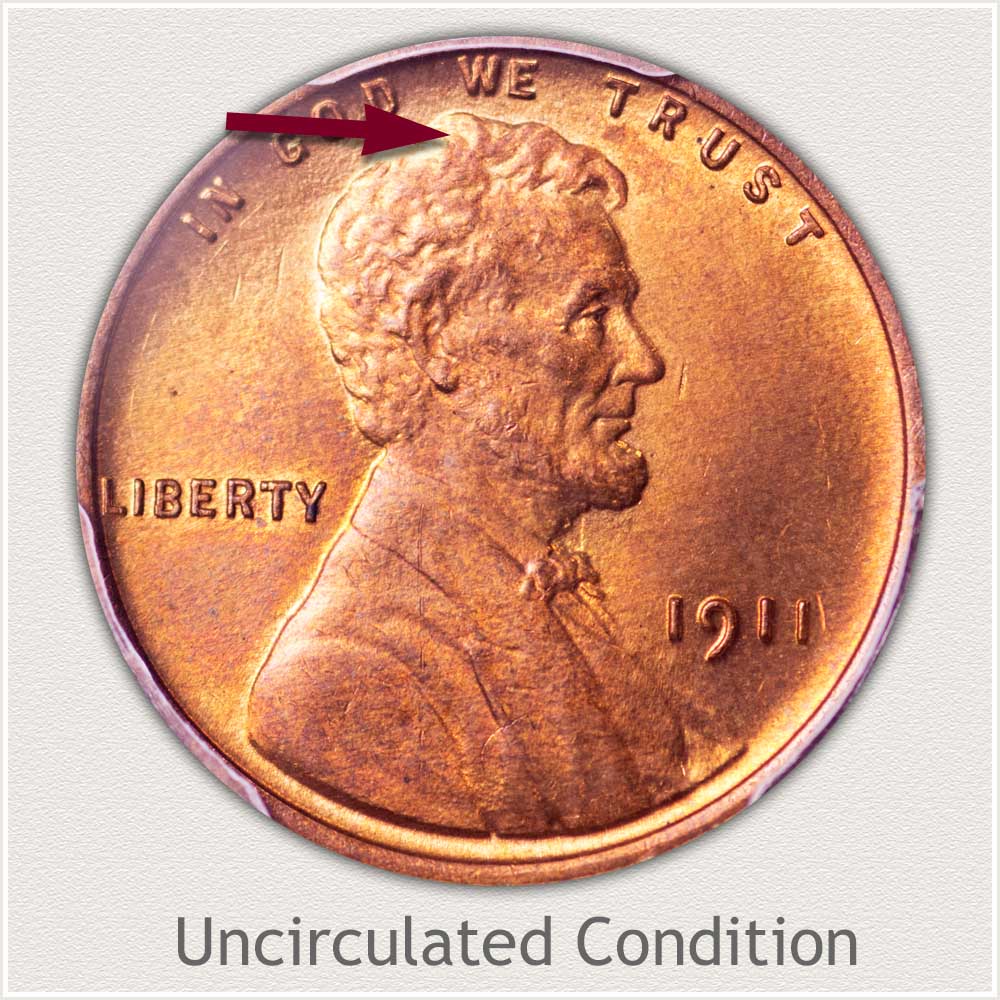
Uncirculated Grade: An uncirculated 1911 cent shows no signs of wear to any surface of design, legends, and fields. Mint frost, imparted at the time of striking remains undisturbed.
One area high in profile are waves of hair above Lincoln's forehead. Somewhat protected by the height of the rim, these waves however are high enough to use as an indicator of wear. Luster remaining on the three uppermost parts confirms a mint state grade.
Even natural color is displayed by this coin. Darker tones of brown are related to age and original toning. Wear to the surface imparts a dull smoothing effect.
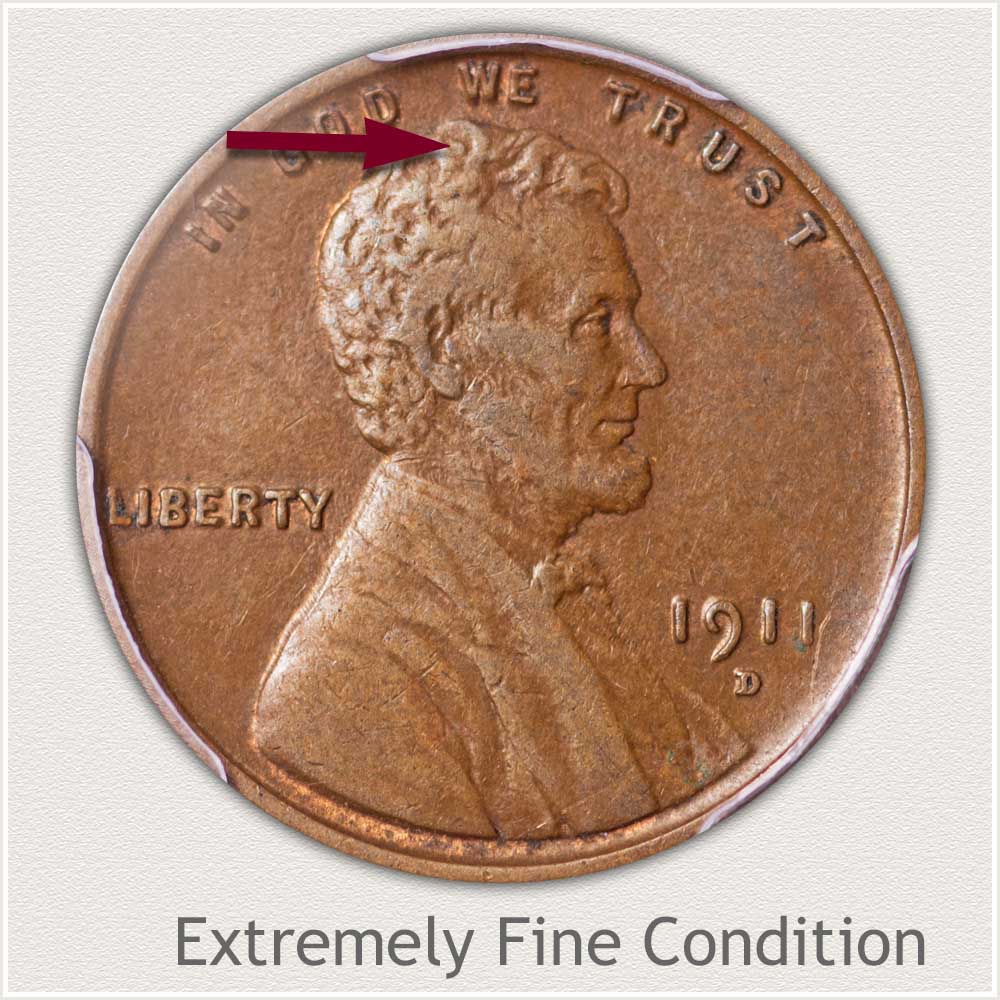
Extremely Fine Grade: To assign the extremely fine grade, wear is very light and only found on highest points of design. Flatness from wear is confined to tops of rounded profiles.
Lincoln's hair above the forehead is indicating minimal wear. Strong detail remains to the waves of hair, each remaining separated. A soft smoothness has replaced the original texture of luster.
Notable is the overall pleasing tan and brown tones of color laying on the surface. Lighter color "highlights" the portrait from the field of the coin. Details are well defined.
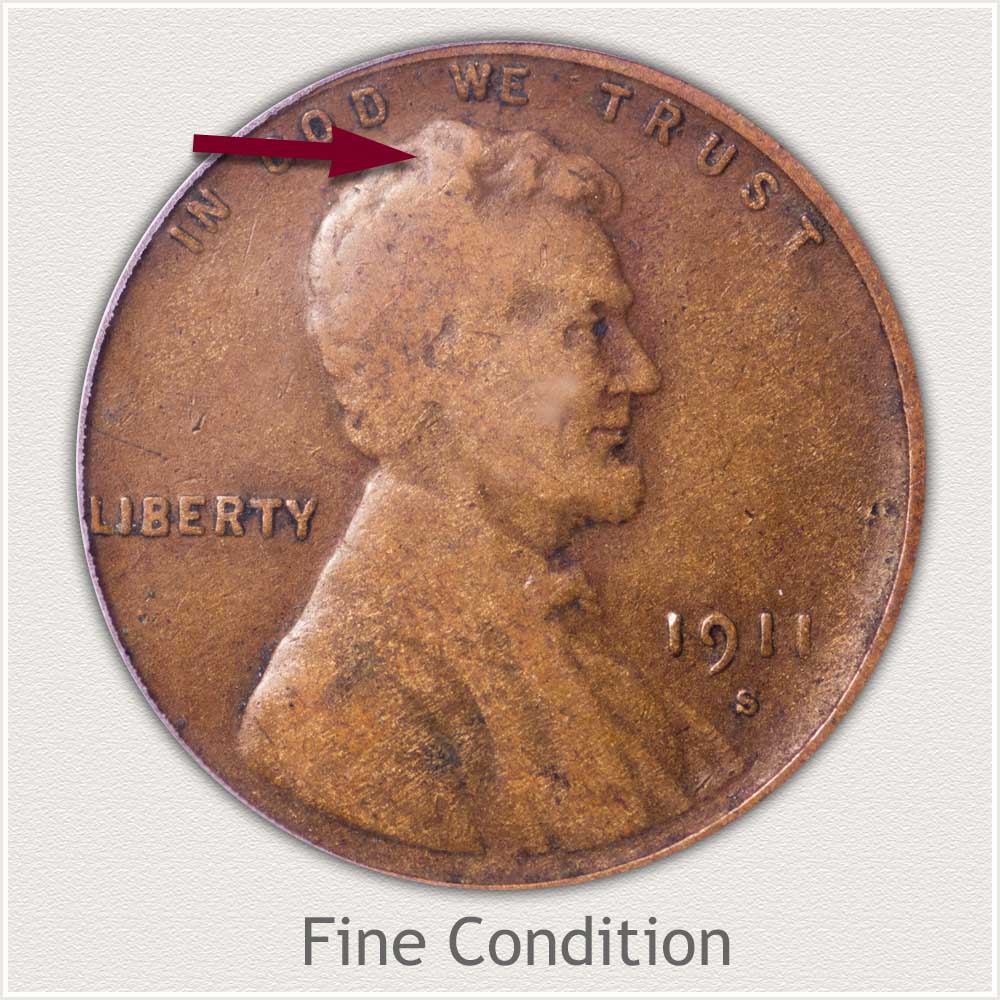
Fine Grade: A moderate amount of wear is evident to a coin in Fine grade. Some areas may show slightly heavier wear. Many finer details are now smooth.
Three waves of hair above the forehead remain visible, although greatly smoothed. Fine inner strands of hair have merged into the flat areas. Enough detail creates a separation of hair from forehead.
Nice color defining the legends and portrait enhancing the eye appeal of the coin. An overall boldness is prominent as well.
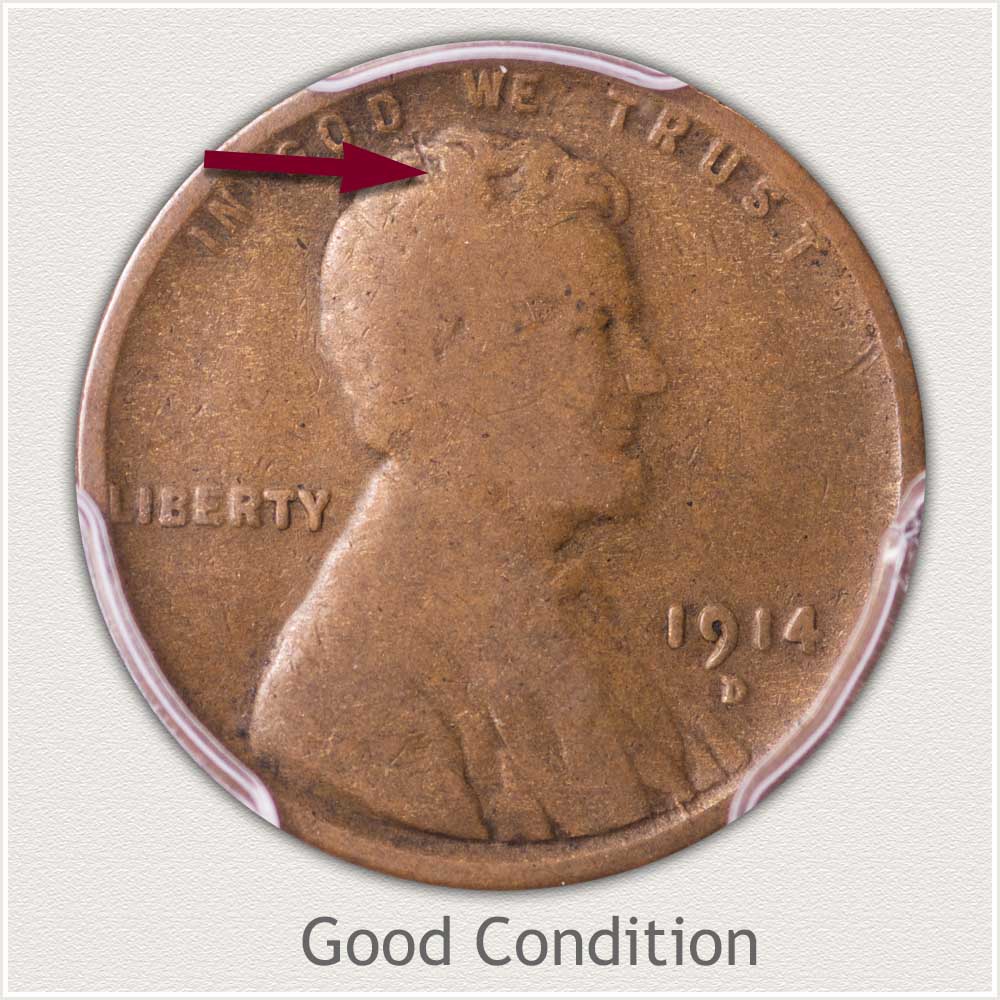
Good Grade: Once heavy wear has removed the majority of design a wheat penny is defined as Good condition. Date, lettering is complete and not merged with the rim.
Lincoln's hair above his forehead is now very worn and mostly flat. Once distinct waves of hair are worn flat and have merges in areas.
Small separation of hair and forehead lends a bit of attractiveness. Lincoln is worn but remains well above the background.
Video | Grading Lincoln Wheat Pennies
In-depth coverage of Grading Lincoln Wheat Pennies goes into greater depths examining grades highlighting factors needed to accurately judge your coin.
Step 3: | Special Qualities Enhancing Value
Thoughts: Wheat Pennies and Successful Selling
Because of the range in value and varied collecting themes, selling wheat pennies involves a multiple approach. Objective is to present and package wheat pennies in a market orientated manner.
An efficient method in the selling process is to group like valued coins together. Begin with separating higher valued pieces from those in the under 20 cent range. From the higher valued group identify the nicer condition examples and create a third group of these.
If you are handling large numbers of pennies, the lowest value coins are counted into 50-coin groups and penny wrappers are used to create a "roll". Check your bank for wrappers needed, coin wrappers as also sold in variety stores. Higher valued coins are kept separated from each other. A solution is using small zip-lock bags.
These three basic groups form an excellent organization of wheat pennies to enter the market. Value ranges and market demand of different levels are represented. Dealers with their time constraints will view all of the coins, however apricate your efforts and have time to evaluate higher valued coins.
The "rolled" coins are very affordable, representing an appeal to collectors, especially young and beginning collectors. One of the pleasures enjoyed is "roll searching". A mixed date roll of wheat cents searched and finding dates to include in a collection is appealing to many collectors. When selling and by presenting correct and suitable coins to dealers in this manner is helpful to the transaction.
A market does exist for wheat pennies. Dealers connect sellers of coins to buyers. They have developed the economic framework to promote an efficient market, providing liquidity and opportunity to connect you to collectors.
ReferencesUS Mint. 1912 US Mint Annual Report https://nnp.wustl.edu/library/publisherdetail/51
Coin Values | CoinStudy Articles
Lincoln Wheat cents span the years 1909 through 1958. From the top condition coins collected by advanced collectors to worn examples; to an affordable collection for young collectors, the range of value is extensive. Identify your date, mint and condition and refer to the value chart.
Coin series enjoy different levels of popularity within the hobby. Lincoln cents are avidly collected and pursued. Values are directly related to their interest by collectors. Knowing a coin is in demand by many is an understanding into your coins.
★ Coin Values Discovery finds 1911 Penny Value and...
All US coin values. Recognize your old coins using the image links leading to value charts. Date | Mintmark | Condition are considered; all described and imaged within each series. Surprising value is often found in the smallest of detail.